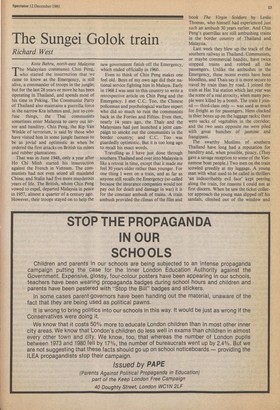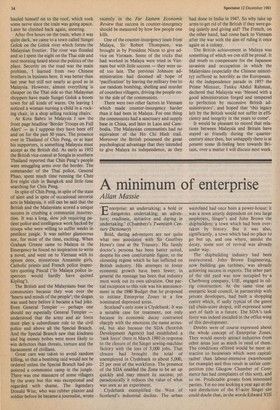The Sungei Golok train
Richard West
Kota Bahru, north-east Malaysia
The Malaysian communist Chin Peng, who started the insurrection that we came to know as the Emergency, is still alive, a commander of troops in the jungle; but for the last 28 years or more he has been operating in Thailand, and spends most of his time in Peking. The Communist Party of Thailand also maintains a guerrilla force in the narrow Kra isthmus and, just to confuse things, the Thai communists sometimes enter Malaysia to carry out terror and banditry. Chin Peng, the Rip Van Winkle of terrorism, is said by those who have visited him in some jungle fastness to be as jovial and optimistic as when he ordered the first attacks on British tin mines and rubber plantations.
That was in June 1948, only a year after Ho Chi Minh started his insurrection against the French in Vietnam. The communists had not even seized all mainland China; and Stalin had five more murderous years of life. The British, whom Chin Peng vowed to expel, departed Malaysia in peace in 1957, almost a quarter of a century ago. However, their troops stayed on to help the new government finish off the Emergency, which ended officially in 1960.
Even to think of Chin Peng makes one feel old. Boys of my own age did their national service fighting him in Malaya. Early in 1968 I was sent to this country to write a retrospective article on Chin Peng and the Emergency. I met C.C. Too, the Chinese policeman and psychological warfare expert who did so much to ruin the communists back in the Forties and Fifties. Even then, nearly 14 years ago, the Thais and the Malaysians had just launched a joint campaign to smoke out the communists in the border country; and C.C. Too was guardedly optimistic. But it is too long ago to recall his exact words.
Travelling as I have just done through southern Thailand and over into Malaysia is like a retreat in time, except that it made me feel 30 years older rather than younger. For one thing I went on a train, and as far as anyone still recalls the Emergency (so called because the insurance companies would not pay out for death and damage in war) it is for the constant ambush of trains. A train ambush provided the climax of the film and book The Virgin Soldiers by Leslie Thomas, who himself had experienced just such an ambush 30 years earlier. And Chin Peng's guerrillas are still ambushing trains in the border country of Thailand and Malaysia.
Last week they blew up the track of the southern railway in Thailand. Communists, or maybe commercial bandits, have twice stopped trains and robbed all the passengers. Unlike the ambushes in the Emergency, these recent events have been bloodless, and Thais say it is more secure to travel by train than by road. I joined the train at Hat Yai station which last year was the scene of a real atrocity, when many people were killed by a bomb. The train I joined — third-class only — was used as much for freight as for passengers. Hens clucked in thier boxes up on the luggage racks; there were sacks of vegetables in the corridor; and the two seats opposite me were piled with great bunches of jasmine and frangipani.
The swarthy Muslims of southern Thailand have long had a reputation for banditry and, when possible, piracy. (They gave a savage reception to some of the Vietnamese boat people.) Two men on the train scowled greedily at my luggage. A young man with what used to be called in thrillers 'an indescribably evil face' kept peering along the train, for reasons I could not at first discern. When he saw the ticket collector approach the young man slipped off his sandals, climbed out of the window and hauled himself on to the roof, which took some nerve since the train was going apace. Later he climbed back again, sneering.
After five hours on the train, when it was quite dark, we came to a town called Sungei Golok on the Golok river which forms the Malaysian frontier. The river was flooded and so I spent the night on the Thai side and next morning heard about the politics of the place. Security on the road was the main problem, I learned from two Chinese brothers in business here. It was better than last year but still not nearly as good as in Malaysia. However, almost everything is cheaper on the Thai side so that Malaysian shoppers have made Sungei Golok a boom town for all kinds of wares. On leaving I noticed a woman nursing a child in a rocking chair, in a shop selling rocking chairs.
At Kota Bahru in Malaysia 1 saw the front page headline 'Border Troops on Full Alert' — as I suppose they have been off and on for the past 30 years. The presence over in Thailand of Chin Peng, or at least his supporters, is something Malaysia must accept as the British did. As early as 1952 the British vice-consul at Songla in southern Thailand reported that Chin Peng's people were smuggling arms over the border. The commander of the Thai police, General Phao, spent much time running the Chez Eve night club in Bangkok and little time searching for Chin Peng.
In spite of Chin Peng, in spite of the state of alert and in spite of occasional terrorist acts in Malaysia, it still can be said that the British and the Malaysians scored a unique success in crushing a communist insurrection. It was a long, slow job requiring patient police and intelligence work backed by troops who were willing to suffer weeks in pestilent jungle. It was neither glamorous nor, for most of the time, exciting. When Graham Greene came to Malaya in the Emergency he found no inspiration to write a novel, and went on to Vietnam with its opium dens, mysterious Annamite girls, Catholic priests and French police inspectors quoting Pascal (`In Malaya police inspectors would hardly have quoted Kipling').
The British and the Malaysians beat the communists because they won over the 'hearts and minds of the people'; the slogan was used here before it became a bad joke. Even General Templer — perhaps one should say especially General Templer — understood that the army and air force must play a subordinate role to the civil police and above all the Special Branch. And the Special Branch saw that kindness and big money bribes were more likely to win defectors than threats, torture and the harassment of civilians.
Great care was taken to avoid random killing, so that a bombing raid would not be ordered unless the Special Branch had pinpointed a communist camp in the jungle. There was one massacre of some villagers by the army but this was exceptional and regarded with shame. The legendary Donald Wise, who was rubber planter and soldier before he became a journalist, wrote recently in the Far Eastern Economic Review that success in counter-insurgency should be measured by how few people one kills.
One of the counter-insurgency team from Malaya, Sir Robert Thompson, was brought in by President Nixon to give advice on Vietnam. Some of the tricks that had worked in Malaya were tried in Vietnam but with little success — they were used too late. The previous Johnson administration had doomed all hope of 'pacification' by leaving the military free to use random bombing, shelling and murder of countless villagers, driving the people onto the side of the communists.
There were two other factors in Vietnam which made counter-insurgency harder than it had been in Malaya. For one thing the communists had a sanctuary and supply base in China, and later in Laos and Cambodia. The Malaysian communists had no equivalent of the Ho Chi Hinh trail. Moreover the British possessed the great psychological advantage that they intended to give Malaya its independence, as they had done in India in 1947. So why take up arms to get rid of the British if they were going quietly and giving aid? The French, on the other hand, had come back to Vietnam after the war with the aim of ruling it once again as a colony.
The British achievement in Malaya was something of which we can still be proud. It did much to compensate for the Japanese invasion and occupation in which the Malaysians (especially the Chinese minority) suffered as horribly as the Europeans. At the independence parade in 1957 the Prime Minister, Tunku Abdul Rahman, declared that Malaysia was 'blessed with a good administration forged and tempered to perfection by successive British administrators', and hoped that 'this legacy left by the British would not suffer in efficiency and integrity in the years to come'.
It would be pleasant to record that relations between Malaysia and Britain have stayed as friendly during the quartercentury since then, but unhappily there is at present some ill-feeling here towards Britain, over a matter I will discuss next week.







































 Previous page
Previous page